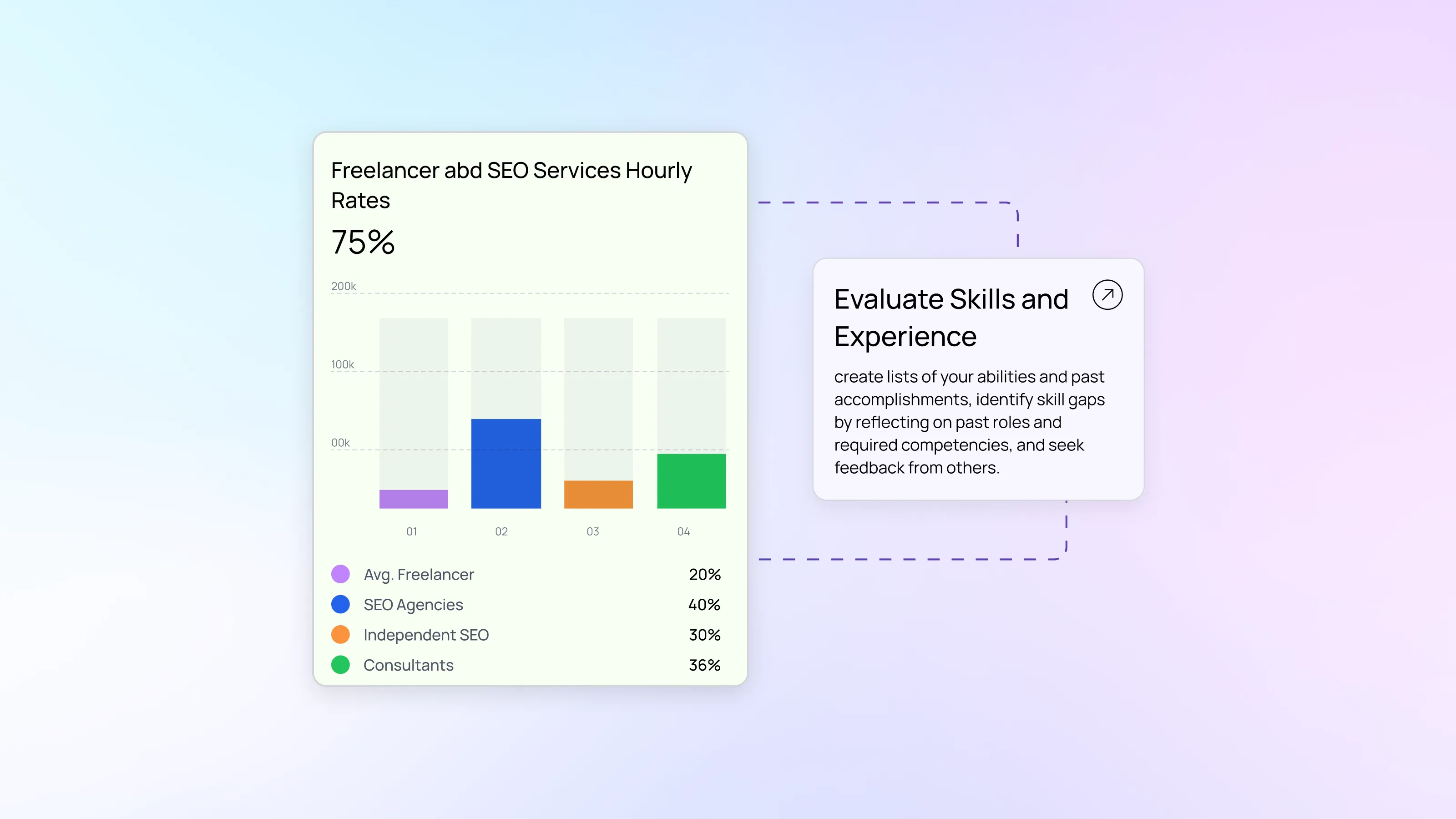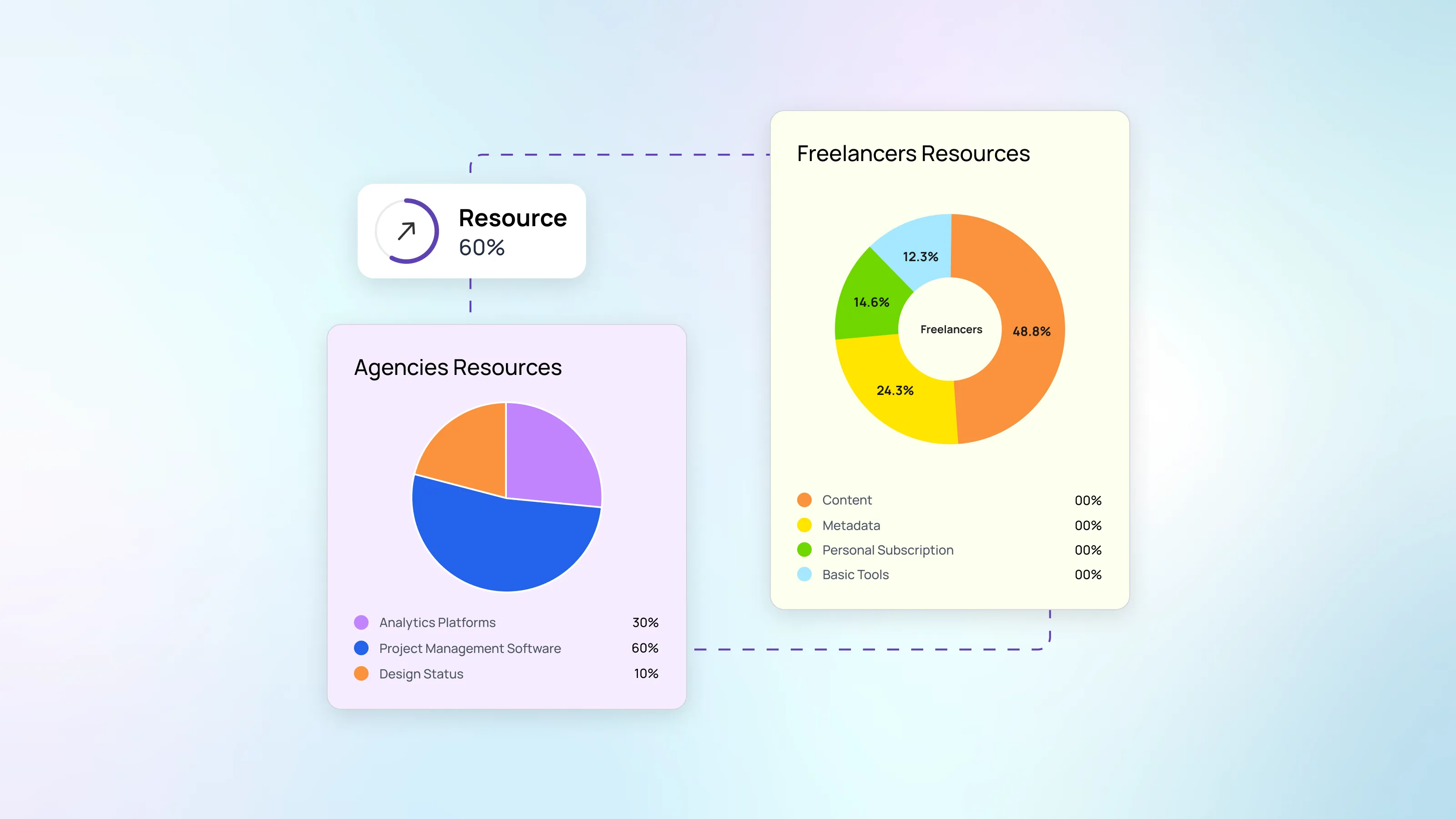Overview
When weighing agencies vs freelancers, the choice is rarely straightforward. Agencies bring collective expertise and structured processes, while freelancers often offer specialized skills and flexibility at a lower cost. In this article, we’ll explore how both models differ across cost, expertise, communication, and scalability - and why the best solution depends on your business stage, resources, and growth goals. By the end, you’ll have a practical framework to evaluate your options with confidence.
Step 1: Identify Your Project Needs
Start by clarifying what you want from your content outsourcing or any other service. Whether it’s SEO, web design, or marketing, a solid understanding of your needs will help you choose the right partner.
-
Determine the core tasks you want completed.
-
Outline your target outcomes, such as a specific level of brand awareness or a certain traffic increase.
-
Note any necessary tools or platforms (e.g., WordPress, Shopify, or analytics software).
Why This Matters
Clear objectives prevent wasted hours and overspending. An agency might bring a wide range of services under one umbrella - research, design, copywriting - while a freelancer typically focuses on a narrower skill set. If your tasks require many specialties, consider How to Choose the Best Marketing Agency for Your Brand in 7 Streamlined Steps.
Step 2: Evaluate Skills and Experience

Once your project scope is clear, evaluate the expertise required. Agencies often have teams with varied backgrounds, whereas freelancers can offer specialized talent at potentially lower rates.
-
Ask about success stories or case studies.
-
Look for relevant industry experience - especially if your niche is highly specific.
-
Request references or testimonials from past clients.
Industry Snapshots
Freelancers contribute $1.27 trillion to the U.S. economy and earn an average hourly rate of $28, although certain skilled services fetch higher fees, as shown by recent freelancing statistics. Recent data shows that hourly SEO rates have generally increased: agencies now commonly charge between $100 and $200, while independent consultants often fall in the $75‑150 ranges.
To find out how freelancers can directly compete with agencies - even for SEO-heavy projects - check out the Freelancer’s Guide to SEO Optimization: How to Compete with Agencies. This covers strategies, pricing structures, and must-have tools for independent professionals aiming to deliver results that rival agency offerings.
Step 3: Compare Freelancer vs Agency Cost
Budget can be the biggest deciding factor. Freelancers often charge lower fees because they have fewer overhead costs than agencies. However, agencies may bundle a range of services into a monthly retainer.
-
Ask whether hourly or project-based pricing is offered.
-
Calculate potential savings from partnering with a single resource who handles everything vs. several specialized freelancers.
-
Compare short-term vs. long-term expenses.
Notable Figures
According to a Fiverr report in partnership with Illuminas, freelancers in Metro Detroit earned an average of $37,335 annually in 2023 - technical specialists earning approximately $51,342, while creative professionals made around $19,972. This contrast highlights how specialized freelancers can command higher earnings even if agencies generally have broader scale.
Step 4: Assess Communication and Collaboration
Whether it’s a single freelancer or an agency team, clear communication matters. Consider how often you prefer updates, which tools you’ll use for messaging, and how many stakeholders need to be involved.
-
Set expectations for meeting frequency.
-
Clarify main points of contact within an agency or with a freelancer.
-
Ask about their process for handling feedback or revisions.
Tips for Better Collaboration
To supercharge collaboration and project tracking, explore Content Marketing Strategy: How to Drive Traffic and Sales, which breaks down the foundations for communicating effectively, structuring campaign assets, and measuring results that matter.
-
Use concise emails or shared boards (e.g., Trello, Asana) to track tasks.
-
Schedule weekly or biweekly check-ins.
-
Share style guides, tone preferences, and examples of content you appreciate.
Step 5: Factor in Timelines and Scalability
Time constraints vary for different projects. You may need a quick turnaround for a promotional campaign or a longer schedule for a website redesign. Agencies have several team members on hand, which can accelerate complex tasks, while freelancers often have fewer available hours but greater flexibility.
-
List your major deadlines, from first drafts to final delivery.
-
Estimate the hours each task might require.
-
Decide if you need continuous support or just one-off help.
Project Speed Insights
According to a November 2023 analysis by SaaSpirin, freelancers - especially SEO specialists - tend to focus more intensely on individual tasks and can often deliver faster results, thanks to minimal internal coordination compared to agencies.
For additional optimization tips - especially if SEO is a primary concern - explore what matters most to independent professionals through Search Optimization Freelancers Trust to Get Clients—Not Just Clicks.
Step 6: Plan Resource Allocation and Tools

Before you settle on a partner, confirm what resources and tools each side can provide. Agencies typically have premium project-management software, analytics platforms, and design suites. Freelancers may rely on personal subscriptions or a basic set of tools.
-
Ask which software licenses they hold.
-
Check if they can supply additional resources, like content calendars or style templates.
-
Find out if you need to offer any paid tools yourself.
AI-Powered Support
If you’re evaluating new business ideas, you can try our AI-powered platform. We create software that simulates a real online presence, generates branding, produces simple websites, and publishes SEO content. The system measures user interest, helping you validate a concept’s market potential early. For a proven framework, discover How to Master AI content creation in 7 Simple Steps.
Step 7: Decide Which Option Fits Your Goals
This is when you bring everything together - cost, expertise, timelines, communication style - to choose the right format for your project. Sometimes, the best route is a mix of both. An agency could handle your long-term brand strategy, while a freelancer tackles specialized tasks like blog formatting or ad-hoc SEO updates.
-
Weigh a single point of contact vs. a multi-person team.
-
Compare retainer arrangements vs. per-project plans.
-
Explore a trial run before committing to a sizeable contract.
Another Angle
If your idea starts small and you want to gauge market interest right away, consider using an AI tool like ours that generates a streamlined website and automatically publishes relevant SEO content. Quick traction often guides your next steps, whether that means scaling with an agency or bringing in a new freelancer for specific tasks. If you’re looking for additional AI-driven solutions and want to take your marketing results to the next level, check out The Best Performing Content Marketing & AI Content Creator for your Business.
Quick Comparison Guide
Freelancers often provide specialized skills at potentially lower rates. Agencies offer a robust set of services, which may include project management, design, and strategic planning. Costs for agencies vs freelancers can vary significantly, so weigh your project’s complexity, budget, and timeline when deciding the right fit.
Conclusion
Choosing between agencies vs freelancers boils down to the nature of your project, desired level of collaboration, and budget constraints. A freelancer can deliver specialized work swiftly, while an agency offers a broader skill set under a single umbrella. Once you define your goals, compare costs, plan communication, and confirm timelines, you’ll be ready to decide which format aligns with your objectives. With a thoughtful approach, you can streamline your undertakings and concentrate on growth.






